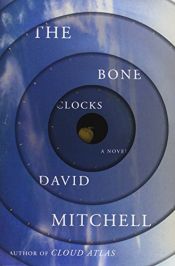The Bone Clocks
Über
An Amazon Best Book of the Month, September 2014: Fans of David Mitchell (Cloud Atlas, Black Swan Green, The Thousand Autumns of Jacob De Zoet) have been salivating over the release of The Bone Clocks —and they have every reason to. This is a feast of a book—perhaps the author’s best to date—a saga that spans decades, characters, genres, and events from Mitchell's other novels. The structure is most similar to Cloud Atlas, with The Bone Clocks pivoting around a central character: Holly Sykes. Each chapter/novella is narrated from the perspective of an intersecting character, with settings ranging from England in the 80s to the apocalyptic future. Each story could stand alone as a work of genius, as they slowly build on Holly’s unwitting role in a war between two groups with psychic powers, culminating in a thrilling showdown reminiscent of the best of Stephen King. Taken together this is a hugely entertaining page-turner, an operatic fantasy, and an often heartbreaking meditation on mortality. It’s not to be missed. – Matt Kaye

 Deutsch
Deutsch English
English Español
Español










Mitglieder-Rezensionen Eigene Rezension schreiben
Morgan
I absolutely loved the first two thirds of The Bone Clocks, but I found the ending to be a huge disappointment. The book opens with a somewhat compelling human drama. The human elements alone wouldn’t make a great book, but they would certainly make a good one. The characters feel real, and their lives are engrossing. Meanwhile, we get glimpses into a centuries-long conflict between immortal higher beings. We don’t find out very quickly who the higher beings are or what they want. They seem to be morally ambiguous, and are strategically planning their moves in what appears to be a long game of chess. We also know that some of the humans have psychic abilities that may come into play later on. What happens next feels like it is written by an entirely different author. All of the moral ambiguity, scheming, and mystery goes out the window. The game of chess turns into a boxing match, and it all starts to feel like the end of a B sci-fi movie. Ultimately, we discover that half of the immortals are pure good, and half are pure evil. Some of the humans are able to take part in the conflict, but their psychic abilities aren’t helpful, and were essentially a red herring. The cunning strategic planning slightly helps, but ultimately the centuries-long conflict ends with a battle wherein the good guys and bad guys shoot fireballs at each other. There is a nice final chapter that picks up the pieces from the climactic battle, and tries to revive the tone from the beginning, but it’s hard to get back into the book after finding out that so much of it was a build-up to a glorified beam-o-war.
Schreibe die erste Rezension